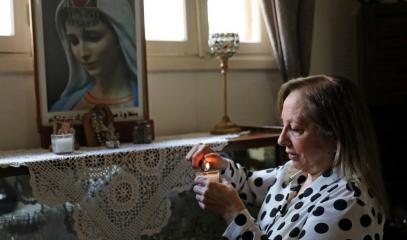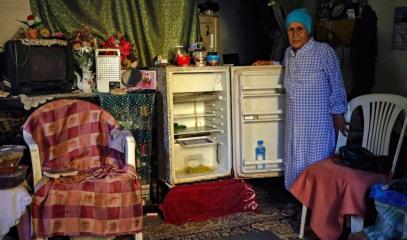Deep wounds and new poor: the legacy of the ‘suspended’ war between Hezbollah and Israel
Lebanon is shaken by a profound humanitarian and social crisis, which the election of a president is not enough to resolve. Among the unresolved knots is the national housing and employment crisis. There is growing food insecurity linked to the collapse of the currency, which has lost 90% of its value against the dollar. The country imports over 80% of its needs, particularly in the food and health sectors.
Beirut (AsiaNews) - In Lebanon, the countdown has begun for the withdrawal of the Israeli army from the dozens of (southern) villages occupied at the end of the war with Hezbollah, which intervened alongside Hamas in the aftermath of the 8 October 2023 ceasefire agreement for the Jewish State.
In accordance with the pact signed on 27 November, an extension of another 60 days was granted to the Israeli military to evacuate the Cedar Country and to the pro-Iranian ‘party of God’ to withdraw north of the Litani river.
The area is then to be occupied - and under the control - of the Lebanese army and the international Unifil force. The withdrawal is imminent and should be completed by 26 January, but all indications are that none of the conflicting parties have kept or will keep their commitments.
Whatever happens, and the coming days will serve to shed light, the reason why this date is so important is not only because Lebanon's sovereignty is at stake. In fact, tens of thousands of Lebanese from this area are impatiently waiting, with relatives or in reception centres, for Sunday's deadline to return to their homes.
This is one of the main humanitarian aspects of the crisis in Lebanon, where 200,000 housing units have been destroyed by Israeli attacks and rebuilding what has been devastated by the war will take years. This is on the condition that the country stabilises politically, a fact that is still far from certain.
It is clear that the election of a new president of the Republic cannot alone solve the problems and, waving a magic wand, erase the dramatic social reality that Lebanon is going through: starting with the plight of a growing number of children, who do not have enough food to eat (one in three, according to the World Food Programme); and again, that of families who have lost their homes and/or jobs; that of the ‘new poor’ whose savings are blocked by the banks; that of the more than 1.5 million Syrians waiting in tents for their country to return to normal; of the hundreds of thousands of Palestinians languishing in unhealthy camps, longing to one day return to their homeland; of the hundreds of female migrant workers abandoned to their fate by their displaced employers; of the corrupt political class that has ruined the country's reputation for solvency.
According to Fr. Michel Abboud, president of Caritas-Lebanon, more than 200,000 Lebanese have still not returned to their homes, two months after the end of the war that has thrown some 1.2 million Lebanese and Syrian refugees onto the streets and squares.
According to data recently presented by Social Affairs Minister Hector Hajjar, at the end of a campaign in which more than 500 social workers took part, there are 182,189 families included in emergency aid programmes for Lebanese displaced by the war. The needs are concentrated mainly in the districts of Saïda, Nabatiyeh, Beirut, Tyre and Aley.
Following the collapse in the value of National Social Security Fund (NSSF) reimbursements due to the devaluation of the pound, which has lost 90% of its purchasing power, existing social assistance programmes, partly financed by the World Bank, are limited.
To date, only families in extreme poverty can benefit from them. As a result, large sections of the population are exposed to hunger, cannot afford medicine, let alone hospital care, and are subject to other deprivations, including dropping out of school and child labour.
According to Layal Abou Rahal, deputy director ofAfp ‘s Beirut bureau, who relays UN estimates, “55% of Lebanese live below the poverty line, on less than USD 4 a day”. In addition, according to psychotherapist Robert Caracache, head of the Foyer de Lumière association, families ‘struggle to survive, children rummage through rubbish, work in shops or perform strenuous work to provide the household with food and basic necessities’.
The hardships suffered by the Lebanese, particularly the displaced families, have been compounded by the loss of employment and the collapse of employment. According to the World Bank (WB), some 166,000 jobs were lost during the war, not counting agricultural losses and damage of all kinds, estimated at around USD 1.2 billion. In order to maintain an acceptable standard of living,' Victor F., owner of an old building that no longer yields him any income because of the rent freeze, tells AsiaNews, ’I have reduced my food as much as possible. I have also banned myself from going to restaurants, I have postponed dental and eye treatment as much as possible, and I have reduced or postponed all insurance and car maintenance costs'.
Behind the glitz of some wealthy neighbourhoods in Beirut or the provinces, the chic restaurants and ski resorts, there are also the ‘new poor’, members of a middle class whose savings are stuck in the banks, victims of the collapse of the credit institutions in 2019. Six years on, the audit of the accounts by the firm Alvarez and Marshall, which must apportion responsibility between the state, the Banque du Liban and private banks for the collapse of some USD 70 billion of private and corporate savings, has still not been accepted.
It is all very well to talk about the resilience of the Lebanese, but the shock of the last war between Israel and Hezbollah has overburdened an already precarious situation, leaving deep scars on the population. It is true that many Lebanese live on the remittances sent by expatriates, estimated at between 6 and 7 billion a year, but these are expedients whose value and regularity cannot be permanent substitutes for salaries and income from stable jobs and cannot be the basis for building the future.
12/02/2016 15:14










.png)










